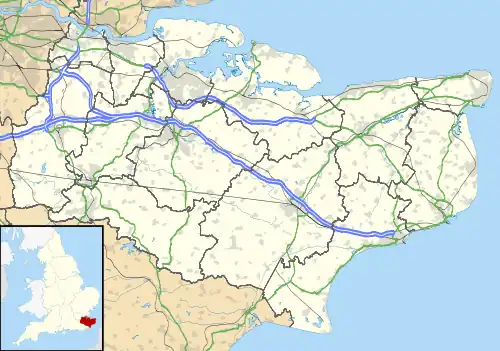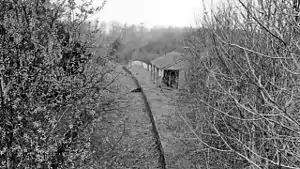Bishopsbourne
Bishopsbourne is a mostly rural and wooded village and civil parish in Kent, England. It has two short developed sections of streets at the foot of the Nailbourne valley 4 miles (6 km) south-east of Canterbury and centred 9 miles (14 km) from Dover. The settlement of Pett Bottom is included in the civil parish.
| Bishopsbourne | |
|---|---|
 Bishopsbourne church | |
 Bishopsbourne Location within Kent | |
| Area | 9.18 km2 (3.54 sq mi) |
| Population | 257 (Civil Parish 2011)[1] |
| • Density | 28/km2 (73/sq mi) |
| OS grid reference | TR189526 |
| Civil parish |
|
| District | |
| Shire county | |
| Region | |
| Country | England |
| Sovereign state | United Kingdom |
| Post town | CANTERBURY |
| Postcode district | CT4 |
| Dialling code | 01227 |
| Police | Kent |
| Fire | Kent |
| Ambulance | South East Coast |
| UK Parliament | |

Geography
Bishopsbourne is located within the Kent Downs Area of Outstanding Natural Beauty.[2]
High-up Goresley Wood occupies about half of the parish, which rises gradually in the south-west. A Roman Britain collective burial mound (tumulus) is at a point in the north-centre of this forested area.[3]
Amenities
A pub trades in Bishopsbourne, The Mermaid Inn, which was built in 1861 and previously called the Lion's Head.[4]
Its church, St Mary's, is one of the Church of England, and contains notable 14th-century wall paintings. It is listed in the highest grading of the national system at Grade I.[5]
The Tadpole Tearoom, located on Frog Lane, opened in a converted farmyard in 2017 and serves hot and cold food, drinks and baked goods.[6]
History
In 1844 an excavation at Bourne Park in the civil parish (and always in the village's boundaries) revealed Iron Age remains.
Mozart visited Bourne Park House in 1765 when it was owned by Sir Horatio Mann. Mann was a cricket patron and a number of top-class cricket matches were held at Bourne Paddock, a ground he built in the park.[7] 10 buildings in the village are listed in the National Heritage List for England and a wall.
On 30 August 1940, a Spitfire piloted by Sgt J I Johnson was shot down and crashed near Bishopsbourne. He was killed in the crash.
Transport
Bishopsbourne had a train station on the Elham Valley Railway until the line closed in 1947. The station building is now a private residence.[8]
Notable residents
Richard Hooker was the Rector from 1595 to 1600. Hooker played a significant part in the development of Anglicanism, championing a 'middle way' between Puritanism and Catholicism. His 8-volume work Of the Lawes of Ecclesiastical Politie was partly written in the Rectory at Bishopsbourne. After his death, he was buried in the chancel of the church, and a memorial to him was provided by William Cowper.[9]
"Oswalds", the house of author Joseph Conrad, still stands and the village hall is called "Conrad Hall" in his honour.[9] The author and naturalist Jocelyn Brooke lived in a house called "Forge House", just opposite the village hall.[9] Photographic pioneer Joseph Bancroft Reade was rector from 1863 until his death in 1870, and is buried at St Mary's.
The poet and mystic A. E. Waite spent most of his later life in Bishopsbourne and was buried in the churchyard at Bishopsbourne in Kent.[10]
References
- Key Statistics; Quick Statistics: Population Density Archived 11 February 2003 at the Wayback Machine United Kingdom Census 2011 Office for National Statistics Retrieved 21 November 2013
- "Boundary Map". Kent Downs. Archived from the original on 28 November 2021. Retrieved 9 September 2020.
- Roman cist burials in Gorsley Wood Historic England. "Details from listed building database (1017617)". National Heritage List for England. Retrieved 3 May 2014.
- "Mermaid". Dover Kent Archives.
- Historic England. "Details from listed building database (1085693)". National Heritage List for England. Retrieved 3 May 2014.
- "Tadpole Tearoom". Tripadvisor.
- Bourne Paddock, Bishopsbourne, CricketArchive. Retrieved 2017-12-17.
- Hart, Brian (2015). The Elham Valley Railway. Bath: Wild Swan Books. ISBN 978-0953877126.
- Scoble, Christopher (2010). Letters from Bishopsbourne: Three writers in an English village. Cheltenham: BMM. ISBN 978-0954154417.
- "Arthur Edward Waite". www.controverscial.com. Retrieved 21 December 2018.
